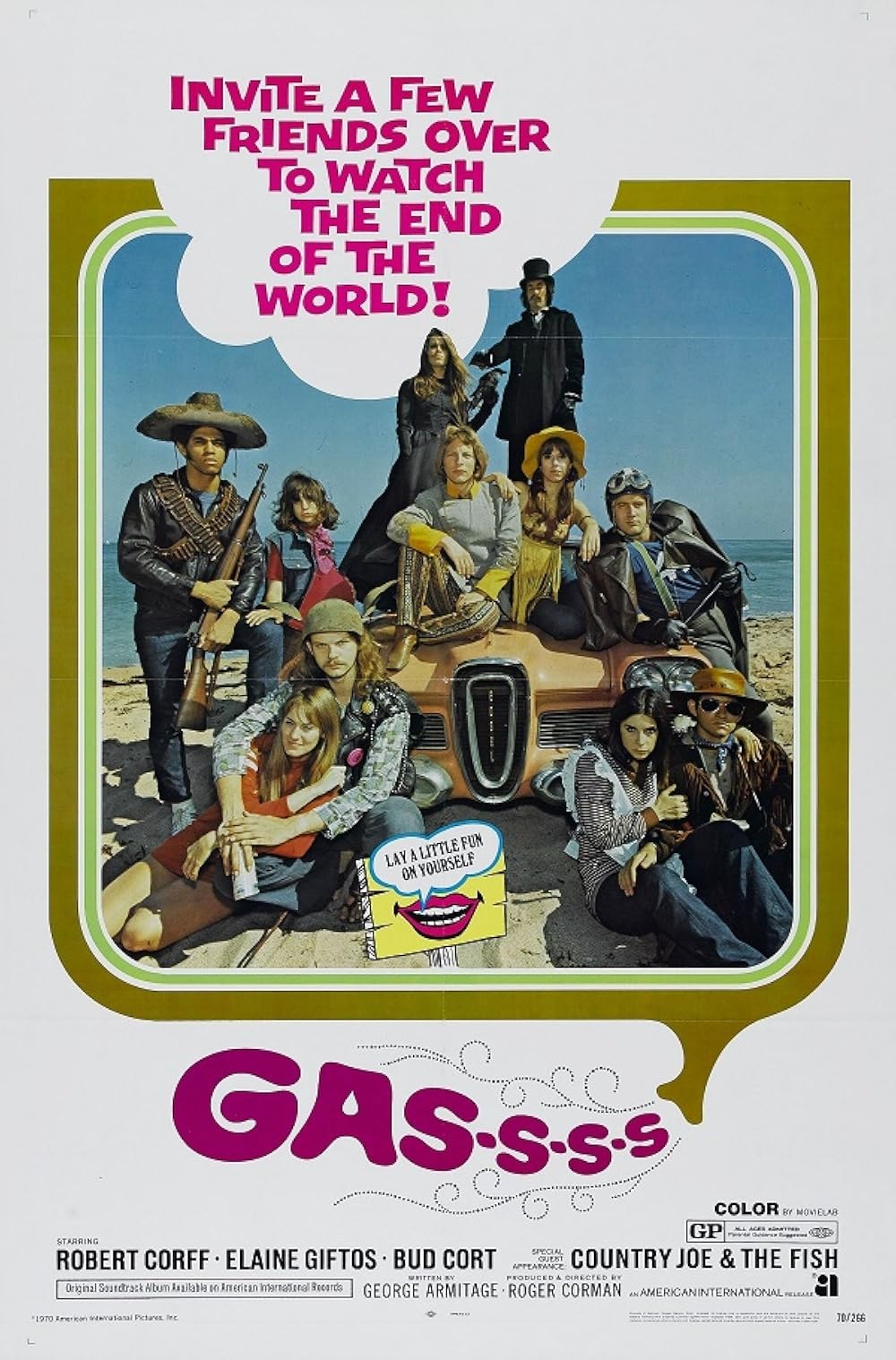by The Fluffer
Few filmmakers are as beloved among buffs as Roger Corman, who directed and produced some of the cultiest movies of their day: Attack of the Crab Monsters, Little Shop of Horrors, The Intruder, The Poe cycle with Vincent Price, The Wild Angels, etc. His films have been much dissected, analysed and adored by fans over the years, which makes the relatively muted reception/legacy to one of his most personal works – if not his most personal work – kind of confusing.
We’re talking about his 1970 post-apocalyptic black comedy Gas! -Or- It Became Necessary to Destroy the World in Order to Save It. The film is set in a world where a gas has killed everyone over 25 and focuses on a series of young adults having various adventures as they find their way to a pueblo in New Mexico.
Gas! (we’ll use the short title for everyone’s sanity) came about at a crucial time in Corman’s career. A decade of constant success in B pictures had seen him conquer that sphere, most often – though not always – working for American International Pictures (AIP). By 1967, he’d reached a peak with the double whammy success of The Wild Angels and The Trip, both of them commercial and cultural phenomena. Corman had less luck “graduating” to the major studios, despite several attempts – they were reluctant to green light his ideas, he struggled with 20th Century Fox over casting and costs on The St Valentine’s Day Massacre, and was fired off A Time for Killing by Columbia. By the late sixties, Corman was unsure where he stood in a Hollywood and America that was becoming increasingly radicalised – he had progressive views and was sympathetic to youth, yet was also a tight-fisted penny pincher with a conservative background (engineering degree, rich dad). All these influences would find their way into Gas!
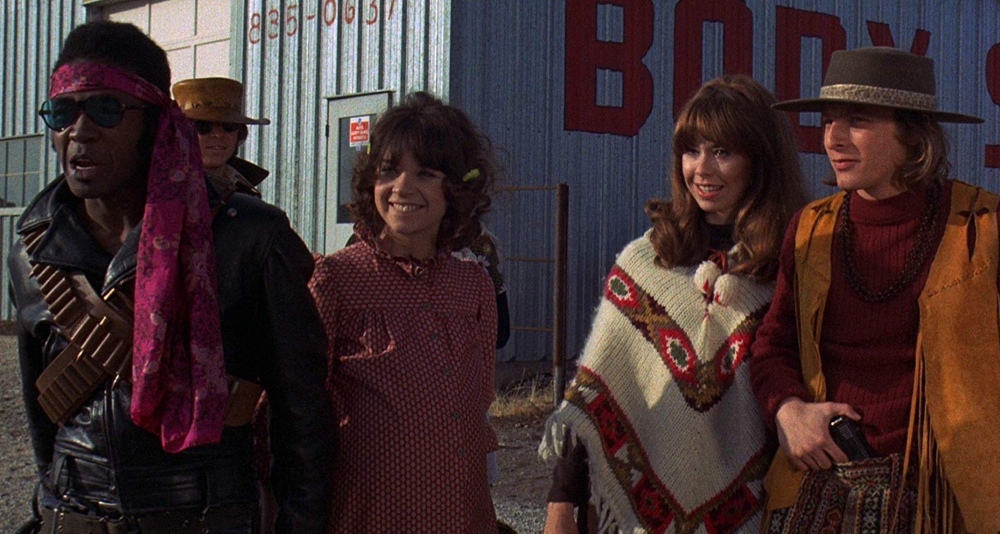
Corman was attracted to the writing of a young production assistant at Fox, George Armitage (who later directed Miami Blues and Grosse Point Blank), and commissioned him to write a draft based on the idea of a world where everyone over thirty dies. Gas! was originally meant to be straight drama – one of Corman’s first big hits was the post-apocalyptic sci-fi cheapie The Day the World Ended – but Corman was dissatisfied with Armitage’s original effort and asked for the writer to turn it into a black comedy, a genre where Corman had enjoyed success via Bucket of Blood and Little Shop of Horrors (Incidentally, the writer of those films, Charles Griffith, was still around, but for whatever reason, Corman didn’t use him). Corman was going to make the film for United Artists, but they hesitated, so Corman decided to finance Gas! himself for $300,000, figuring that he could always sell it to AIP (which proved to be the case). Incidentally, AIP had recently enjoyed a big hit with the comedy drama Wild in the Streets (1968) about an America where the voting age is lowered to fifteen and Gas! fitted into that “youth rebellion” template. Corman shot the movie in New Mexico in 1969 with a barebones crew and the script being rewritten as it went along.
Corman’s previous movie as director, The Trip, had been very personal – the story of a successful director at the crossroads in life who takes LSD and… has a pretty good time, to be honest (Tim Lucas dramatised this as The Man with Kaleidoscope Eyes). Gas! pushed this personal connection even further – indeed, to such a degree that the film can be seen as a summation of Corman’s career to date.
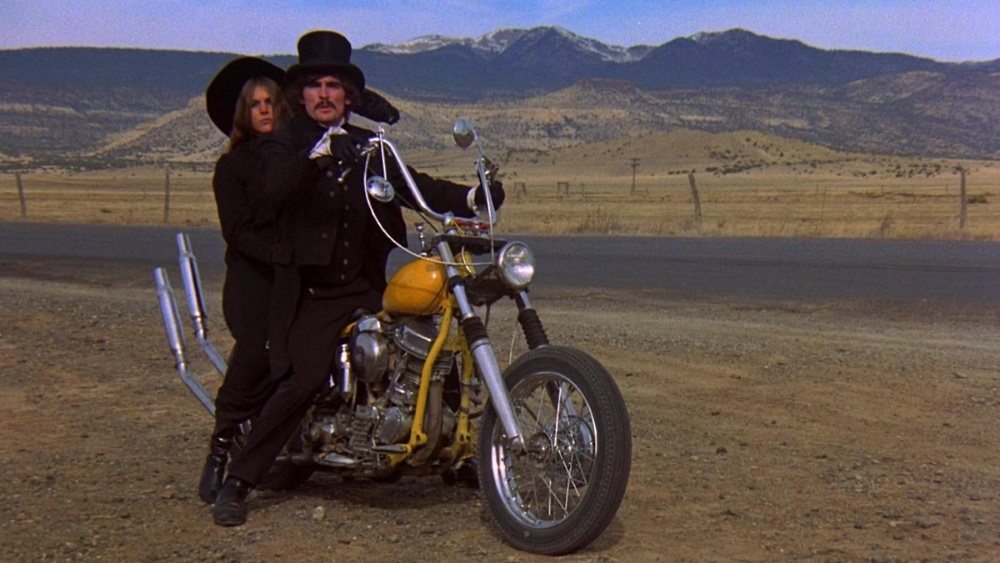
There’s a fresh-faced, straight white male hero (Robert Corff) who is a Corman surrogate: he loves sex and hanging out with his buddies, but is uneasy with macho types (cops, bikers, jocks). The villains in the movie are all the aforementioned macho types, who turn fascist – Corman showed disregard throughout his career for such people (for instance, while the director kicked off the biker cycle with The Wild Angels, bikers come across terribly in that movie – as do gangsters in his gangster films, and tough cowboys in his Westerns). There are several bright sparky female characters, who like sex and having fun, as was the case in many a Corman movie. The Robert Coff character encounters a group of misfits and oddballs who go on a journey (as Corman did every time he made a film). There are allusions to all the pop culture influences of Corman’s career: literature high and low (digs at Harold Robbins and Jacqueline Susann are not surprising from someone who was a bit of a literature snob and briefly went to Oxford), Edgar Alan Poe (who appears as a character), Westerns; there’s even a sex scene which is a direct homage/rip off of the one in The Trip.
Gas! displays a distrust of authority and love of independence, funky music (Corman films often had excellent music scores), a reluctance to dwell over sadness (the bulk of the world being wiped out barely rates a mention), an enthusiasm for rape scenes (we’re not being flippant, they turn up all the time in Corman movies). The cast and crew are studded with future big names, including Ben Vereen, Cindy Williams and Talia Shire in front of the camera and Armitage, Frances Doel and Stephanie Rothman behind it.
Like many Corman movies, Gas! is politically progressive but more conservative than it might appear: the hippies get their car back by using guns, and Corman (never great with black characters) breaks up his interracial couple.
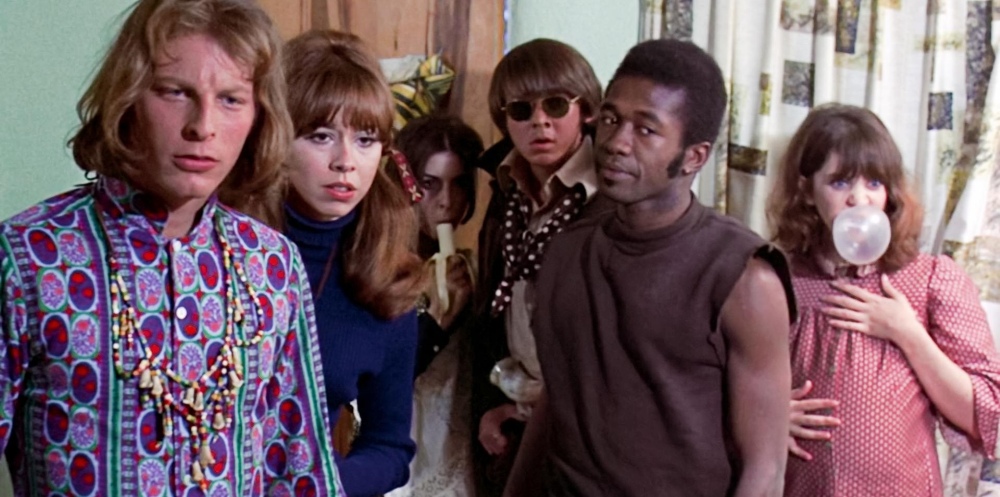
The cast are enthusiastic: Robert Corff and Elaine Griftos make a likeable pair of leads, Cindy Williams has a great monologue, there is a strong support cast. The real star is the script – well, that’s half correct: the script is frustrating and episodic, but just when you get sick of it, Armitage throws in a curve ball of some line of brilliance. The ending is unexpectedly uplifting – everyone coming together in a party (we’re not exactly sure why).
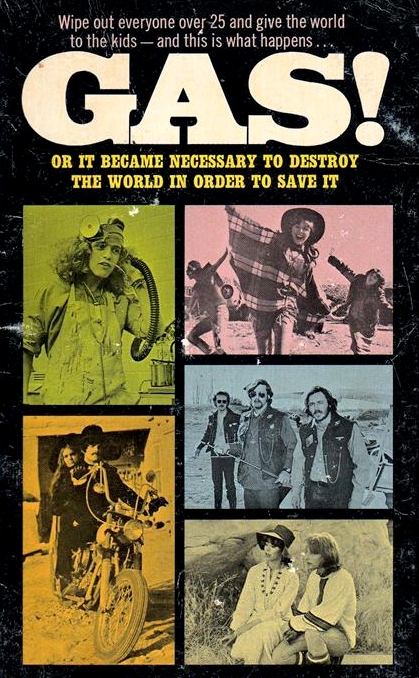 Some of the highlights include a shoot-out where the characters keep yelling out cowboy star names (Ben Vereen yells out “Jim Brown” – because “he’s the only one” i.e. only black); Billy the Kid having a horse called “Pretentious”; Country Joe and the Fish talking to God and God responding about a car in the parking lot having left its lights on; a footballer tries to inspire a crowd – after yelling “one more time” the crowd replies “one more time”); bikers talk in war metaphors on the golf course; some tangy dialogue: “was that a bomb?” “no, it was more ironic than that”. It pokes fun at the military, Nixon, the JFK assassination, Westerns, early ‘60s rock, B movie Western stars, Edgar Allen Poe, football players.
Some of the highlights include a shoot-out where the characters keep yelling out cowboy star names (Ben Vereen yells out “Jim Brown” – because “he’s the only one” i.e. only black); Billy the Kid having a horse called “Pretentious”; Country Joe and the Fish talking to God and God responding about a car in the parking lot having left its lights on; a footballer tries to inspire a crowd – after yelling “one more time” the crowd replies “one more time”); bikers talk in war metaphors on the golf course; some tangy dialogue: “was that a bomb?” “no, it was more ironic than that”. It pokes fun at the military, Nixon, the JFK assassination, Westerns, early ‘60s rock, B movie Western stars, Edgar Allen Poe, football players.
On the downside, the stuff where football players practiced their rapes was off; ditto the scene where Giftos offers herself up as a “rapee” – she ends up having sex with three men and apparently enjoys it. Also, the film feels abrupt in places – one moment the world is normal, then we hear the gas is coming – then the gas has hit and kids are already recreating fascism. There’s never any weeping for anyone’s parents, relatives or friends over 25 – it’s all a bit of a joke.
Gas! was a big critical and financial flop when it came out. Corman blamed AIP, being especially critical of them removing his final tracking shot of all his characters where God spoke over. We don’t think this wrecked the movie – you can still hear God over the end credits – but the change was not only kind of pointless, it was very disrespectful for AIP to treat Corman that way, especially as that filmmaker had basically made the studio. This poisoned relations between Corman and AIP (already touchy because of studio changes to The Trip) and contributed to Corman ultimately forming his own company, New World Pictures, which replaced AIP as the leading independent film studio in town. So, after making one more movie, Von Richthofen and Brown, for United Artists, Corman returned from directing to focus on New World. Gas! is his farewell as a director. The movie is odd, wild, flawed, problematic, funny, smart and dumb. But you can’t appreciate Corman’s career fully without seeing it.


